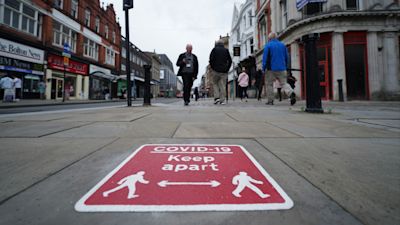Coronavirus: Bolton placed under strict local lockdown, Matt Hancock announces

Video report by ITV News Health Correspondent Emily Morgan
Bolton has been placed under a strict localised lockdown after a "very significant" spike in coronavirus cases, the health secretary has announced.
Hospitality venues are being restricted to take away only, Matt Hancock said, and late night restrictions have been placed on businesses meaning all must close from 10pm to 5am.
It has also been made illegal for people to socialise with anyone outside their household after the government turned previous advice into law.
All changes take effect "immediately", the health secretary said.
Stacey Foster explains the latest from Bolton:
Mr Hancock said the updates were being made to stem the spread of coronavirus following a "very significant rise in cases in Bolton" related to young people attending pubs.
"Bolton is up to 120 cases per 100,000 of population, the highest case rate in the country and I'm publishing the data behind the decisions that we've taken."
He told MPs in the House of Commons that "just because we've come through one peak, it does not mean we cannot see another one coming" following a rise in coronavirus cases in the UK.
'A second wave is coming': WHO special envoy warns of UK Covid surge
SAGE scientist warns coronavirus cases 'increasing exponentially'
Deputy chief medical officer: Rise in Covid cases a 'great concern'
In a plea to residents of Bolton, the health secretary urged everyone, particularly the young, to obey the new rules.
"I know social distancing can be hard, and how it can be extra-tough for students who will be starting university - but please, stick with it and play your part in getting this virus under control."
He added: "We're asking you to take a step back at a time when we all just want to get on with our lives and what we love and back to normal. But we need to take this crucial step to keep the virus at bay.
"Because as we've seen elsewhere, if we act early and control the virus then we can save lives."
Last week Bolton almost had its coronavirus restrictions lifted, before the government was forced into a U-turn.
Along with Trafford, the town was due to have restrictions on social gatherings removed, but local leaders said cases were rising too quickly for any relaxation to take place.
At the time data for Bolton showed the weekly incidence rate was at 66.6 per 100,000.
Since then it has almost doubled to 120 cases per 100,000.
The number of coronavirus cases in the UK: explained
Bolton is among several Greater Manchester towns which have been placed under local lockdown since the national lockdown was relaxed on June 23.
The region's mayor, Andy Burnham, has been angry with the government over what he says has been a lack of communication between local and national government when considering new restrictions.
After new rules were announced for Bolton, a spokesperson for the Greater Manchester Combined Authority revealed Mr Burnham and others were not consulted.
The spokesperson said: “This decision was taken by the Government in consultation with Bolton Council.
"Neither the Mayor nor the Council leaders of the nine other boroughs in the city-region were involved.
"We recognise the serious situation in Bolton and have offered any support they may need.”
Mr Hancock said the UK must "learn the lessons from Spain, America and France" - countries which may currently be experiencing a second wave of the virus - by acting quickly to stop local outbreaks.
In a statement, he said: “Today’s ONS figures show that the weekly coronavirus deaths have dropped to their lowest number since mid-March and the latest daily number of recorded deaths is three.
“However, we have seen a concerning rise in the number of positive cases, particularly among younger people, and these figures serve as a salutary reminder that this virus is still very much with us and remains a threat."
Mr Hancock warned younger people that the "long-term effects can be terrible" for those who get Covid-19.
He said the huge rise in cases in Bolton is "due to socialising by people in their 20s and 30s".
"So it is critical that we maintain our collective commitment to controlling this disease, and social distancing is the first line of defence. While young people are less likely to die from this disease, be in no doubt that they are still at risk," Mr Hancock told the Commons.
"The long-term effects can be terrible and of course they can infect others. Six months on many people are still suffering from chronic fatigue, muscle pain, and breathing difficulties, previously fit and healthy people reduced to barely being able to function. "